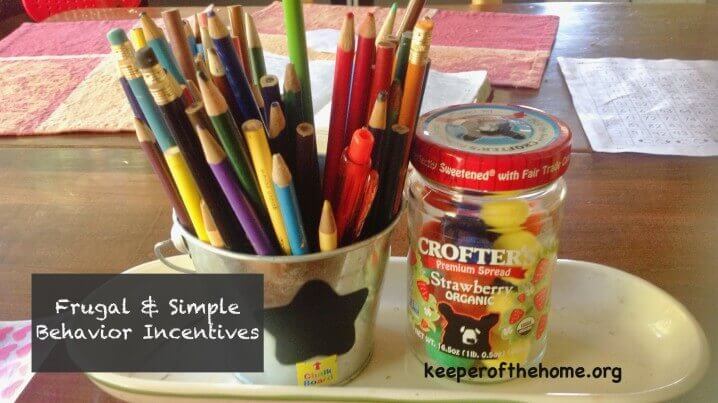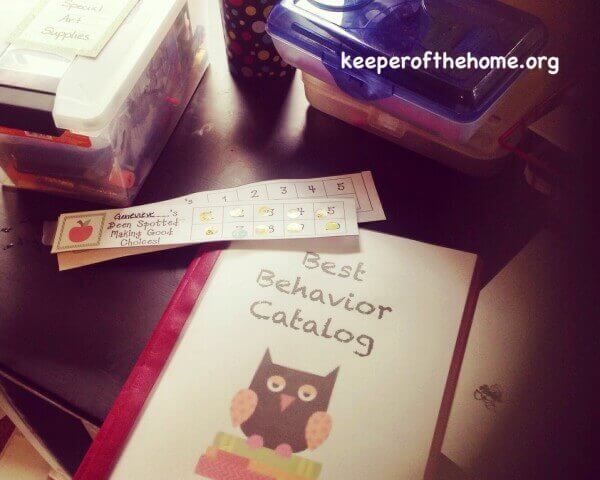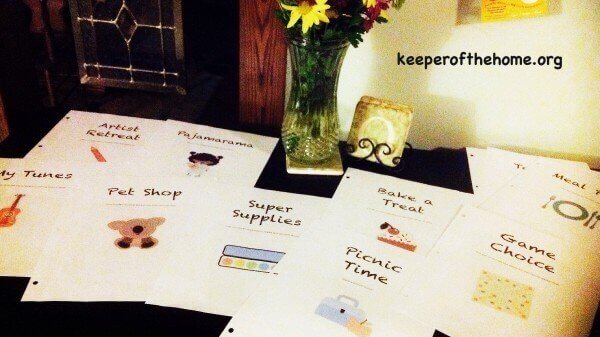One Small Change: Frugal and Simple Behavior Incentives

Want to ditch the chore charts? Check out Michele’s frugal and simple behavior incentives!
By contributing writer, Michele of Frugal Granola
In the midst of an overwhelming parenting season, I made one small but drastic change: I eliminated our chaos of monitoring chore charts, tallying allowance earnings per chore and restocking prize boxes.
This may seem counterproductive toward creating the order I craved, but the disorder was more heartfelt than physical. I needed my tools for equipping and discipling my children to fit our values.
I decided to implement a plan for promoting our family values of teamwork, respect, personal responsibility and tangible (“non-junk”) rewards.
Since I am a homeschooling mama of young children with varying abilities, I needed the simplicity of a plan that worked for all ages.
I adapted some effective behavioral incentive ideas from public school teachers for use in our home, combined with the use of the 1-2-3 Magic boundaries recommended by a therapist for one of our children last year.
I ended up with our own family system that has three key elements:
Teamwork Jar
I reward cooperative teamwork behavior for group activities that benefit the household or community by adding colorful pom-poms in a jar (see above photo).
For example, each day I will set a timer for a ten minute clean-up time* and expect the kids to successfully work together to pick up their toys, or sweep and dust while I scrub or vacuum. I don’t have to worry about keeping track of individual chores; everyone is expected to lend a hand to clean up.
I also use this to reward helpful behavior when we have a babysitter. When the jar is full, we earn a popcorn and movie party for the family. (I borrow videos from the library.)
Since our children are still young, I make sure that the reward happens within a short amount of time by adding a few pom-poms for each event to fill it usually within a week or two.
*By the way, as a consequence, the kids know that I will come in with a trash bag and throw away/return/keep any items left out. They learned quickly; I only had to do this once or twice. They have an option in the following catalog to earn back “non-trash” toys.

Best Behavior Catalog
Since I am currently teaching my children to do some of their homeschool desk work independently, I randomly award diligent behavior with a sticker on small cards taped next to our study area (each child has their own).
I don’t have to keep track of specific chores, or even awards every day.
But my children quickly learned that if they do not try to do their best work, or choose to distract others, they will certainly not be rewarded. I print off the cute little “good choices” cards from here; we use the 10 square ones, but there are also smaller and larger ones in the set for a faster or more lengthy award time frame.
When the squares are full (usually within a week or two), they can choose from our “Best Behavior Catalog.” I was inspired by this teacher’s idea, and tailored it to my own children.
This is where I have eliminated “treasure boxes” of plastic toys or even expensive rewards.
My goal is to show them that positive behavior is a choice, and it results in enjoyable quality time with others; we’re not going to buy them something for “being good.”
Each page in my homemade catalog has an award option plus a large picture illustration for my preschooler. So, in the catalog, they can choose from an assortment of 15-20 activities, such as:
- Bake a special treat with Mom
- Pajama Day
- Special Art Supply Time (I have a special box of “fancy” craft items set aside.)
- Picnic Lunch
- Tool Time with Dad
- Choose a CD to play during school time
- Plan the Menu for a Meal
- Pick the Game for Family Game Night
- Nail Polish with Mom
- 10 minute Massage from Mom
Allowance
We decided not to get rid of the money aspect completely since we want to teach our children about the basics of economics, such as the value of money, appropriate spending/saving choices and tithing at church.
This is the element recommended by the therapist that coordinates with the 1-2-3 Magic. We’ve set a flat amount that each child can earn per week (such as 75 cents, since they are still young enough to be fascinated by shiny quarters).
If we are in a situation, such as in the car, where a timeout does not work but is needed, we subtract five cents instead. (I just keep a tally in my head at this point.).
Plus, there a few current “problem area” standard daily activities such as putting dirty laundry in the basket and not leaving it in the family’s doorway, which can result in an automatic five cents deduction if not completed. At the end of the week, any allowance they still have left is paid. No one has ever earned the full allowance, by the way, so this has been pretty frugal for me. Total monthly expenses are usually around $3-$4.
It’s a Season
Right now, this combination of elements works for us. Other families may find just part of this or something entirely different works for them.
I’m sure the need for this will decrease, and our teaching focus points will change as our children grow older, so this certainly isn’t permanent. I’m definitely not a perfect parent, and my children still have their crazy moments, but we have recently received many encouraging comments on the difference people can see in behaviors.





One crucial thing I do: let the other children share in the reward, but to a lesser extent. That helps the children encourage each other and removes all competitiveness between them.
Definitely. Our system doesn’t have any competition, either, and they always offer to share with each other. 🙂
This is fascinating. I am going to be thinking a lot about this and how I can use it in our home. Positive reinforcement is so effective and this is definitely doable. Thanks so much for sharing what works for your family!
You’re welcome! Thanks so much for you comment, Leigh Ann. 🙂
I was just pondering this morning, amidst the bustle of getting everyone out the door for school, how to get my five year old son to stop complaining about anything and everything. I think I will start a reward for smooth mornings and some type of privilege deduction for complaint-filled ones. Thanks for writing what I needed to read today!
Sounds like a great idea! I hope you have smooth, happy mornings soon.
I love all of these ideas! I’ve had such a hard time keeping up with allowance charts and rewards, yet my husband and I want our children to do certain tasks just because they’re part of our family and home. Thanks for giving me some inspiration!
You’re welcome! It is the ability to randomly award that makes this work for me. No one is obsessed with awards, and I’m not frazzled about forgetting. It just ends up being a fun surprise for them when they do get recognized, instead of behaving only for a reward. 🙂
When they pick the family activity, who picks it? I could see arguments in our house about getting to pick which activity:)
For the movie night earned by filling the jar, I pick the movie out at the library and surprise them. For the family game night, the child that earned the prize by filling up their sticker card chooses the game. I try to randomly award the stickers, so I don’t have multiple winners in one day. 😉
Hopefully that makes sense… there is just one jar to earn the family movie party. But each child has their own sticker card to choose their individual award from the catalog. We haven’t had any complaints, since everyone knows it is that child’s prize.
I like the idea of the behavior catalog. That’s on the to-do list! I do have some concern with deducting money for inappropriate behavior or not completing a task. In the real world, it’s not the norm that someone is deducting money from your paycheck for having a bad day or struggling with a task. I use a lot of natural consequences to teach the reality of what happens when you don’t take care of things or follow the rules… clothes in front of the door, they don’t get washed, no clean clothes, no doing fun things in dirty clothes or pjs. We had a problem with clothes being left on the floor, but it didn’t last long once my oldest realized he couldn’t join us for an ice cream treat or go for a walk in his underwear 🙂
Yes, we use the natural consequences a lot. The deductions system was encouraged as an option for certain situations by our child’s therapist to meet specific needs. Do what works for your family. 🙂
Thanks Michele. We’ve been thinking about implementing something like this in our home. Blessings!
You’re welcome! Thanks for reading. 🙂